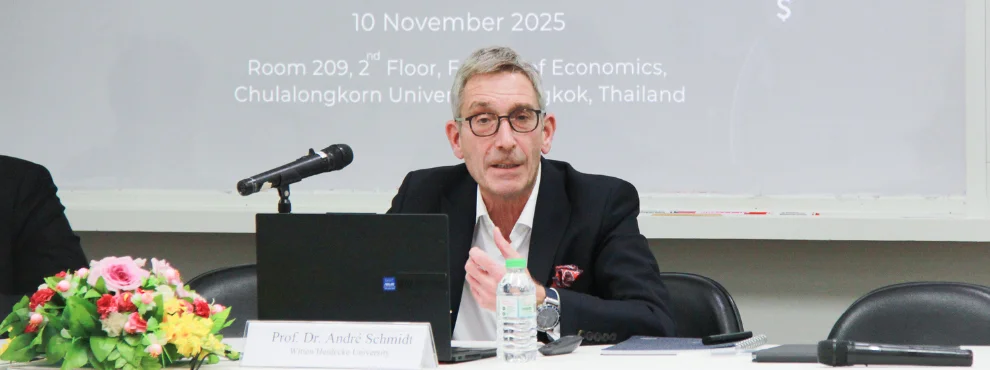Prof Dr André Schmidt talks about the opportunities, risks and geopolitical power games of the BRICS+ countries
Prof Dr André Schmidt from the UW/H gave a lecture in Bangkok on the geo-economic challenges posed by the expansion of the BRICS states to BRICS+.

Prof Dr André Schmidt, Chair of Macroeconomics and International Economics at Witten/Herdecke University (UW/H), was invited by the ASEAN Studies Center at Chulalongkorn University in Bangkok, Thailand, to give a lecture on the geo-economic challenges associated with the expansion of the BRICS countries to BRICS+. The BRICS countries originally comprised Brazil, Russia, India, China and South Africa. The alliance now comprises eleven members - with the addition of Ethiopia, Egypt, Iran, Saudi Arabia, the United Arab Emirates (UAE) and Indonesia.
Geopolitical reasons for the expansion from BRICS to BRICS+
The conference in Bangkok focussed on geopolitical tensions and their impact on the global economy. In his lecture, Prof Dr André Schmidt showed that the efforts to expand the BRICS states can be explained purely by geopolitical motives: They are trying to create a political antithesis to the G7 states. Economic welfare gains are not to be expected in view of the heterogeneity of the member states.
Schmidt also takes a critical view of the BRICS+ countries' endeavours to become increasingly independent of the US dollar as the world's reserve currency. Global central banks, governments and financial institutions use a world reserve currency as a central means of storing value, for international transactions and to hedge currency risks. In the short to medium term, a common currency of the BRICS+ states, however backed by gold reserves, could not fulfil the requirements of a world reserve currency. Furthermore, it will be very difficult to agree on a common policy due to the conflicts of interest between China and India and the heterogeneity of these states.
Access to raw materials could be restricted
According to Schmidt, however, the greatest threat to the global world trade order is China's efforts to monopolise access to important raw materials with the help of the BRICS+ countries. Through its strategies within the BRICS+ states, China is not only securing sales markets, but above all access to important resources and raw materials, which are essential for the digital transformation in particular. Schmidt sees this as the greatest challenge for the European Union, which has not yet found adequate answers.
At the same time, Schmidt argued that the merger of the BRICS+ countries should not always be seen as a threat. There could also be considerable opportunities for cooperation between the G7 states and the BRICS+ states in the area of climate policy and fair trade relations by limiting subsidies. However, there is still a long way to go until then, which will also require some diplomatic skill.
